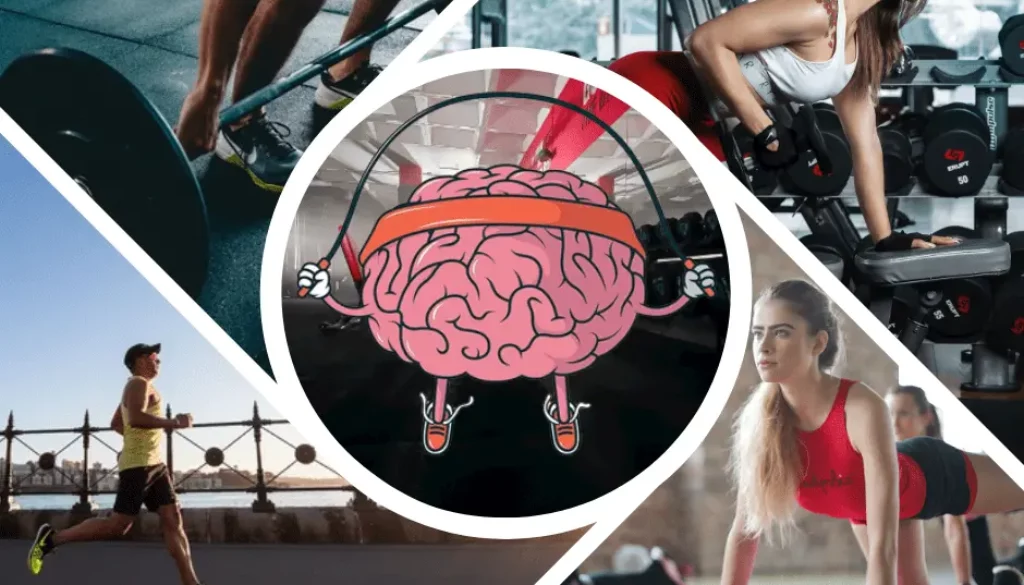Exercise and Mental Health, Unlock Your Healthy Brain Functioning
Exercise and mental health.
Introduction
Exercise benefits go beyond increased muscle mass and cardio efficiency. Yes, exercise can enhance your physical health and physique, reduce belly fat, enhance your sex life, and even lengthen your life. But those are not the only incentives that push people to stay active.
Physical activity is an essential part of living a healthy lifestyle. Exercise not only enhances physical abilities and can alter one’s looks, but it also improves someone’s mental health.
Physical activity has several beneficial cognitive effects
- It increases heart rate, allowing more oxygen to reach the brain. Thus, more nutrients are delivered to the brain. This process improves, among others, waste removal.
- It stimulates the release of hormones that aid in the growth of brain cells.
- One of the hormones is the Brain-Derived Neurotrophic Factor (BDNF). It protects and repairs neurons from injury.
- BDNF, also, works with the other hormones to grow new interconnections between brain cells, promoting brain plasticity.
- Major neurotransmitters, such as dopamine, serotonin, endorphin, and norepinephrine, are modulated by physical activities, regulating mood and providing mental clarity.1 A single workout is enough to unlock the release of those, and other “well-being” chemicals (endorphins and endocannabinoids).

Proceeding in the same way, this list can certainly be extended. Nonetheless, scientists noticed that the effects of physical activities are more notable when considered in succession.
Technically, researchers define physical exercise as a structured and repetitive physical activity that aims at improving some component(s) of physical fitness.2
With this definition in mind, experts showed that physical exercise is a gene modulator, implying that it can induce changes in brain functioning.3
Following this concept, they have found many benefits of consistent exercise engagement. This includes the activation of pro-inflammatory mechanisms, which ultimately lead to the synthesis of new synapses, blood vessels, and neurons.3
It also contains the release of hormones such as CRH (corticotrophin-releasing hormone) which modulates cortisol and adrenaline levels. And there’s more. Exercise is associated with improved prefrontal cortex-dependent cognition and functional neuroplastic changes.2 That’s why researchers suggest regular exercise to prevent or delay diseases like Alzheimer’s and Parkison’s.
Additionally, physical activity maintains a sense of well-being that helps our brain, keeping it young and active.
But what do all these mean in terms of “mental health”?
Exercise and Mental Health
Depression
Are you questioning the correlation between exercise and depression?
Huh, consider this.
After one workout, your brain is flooded by endorphins and endocannabinoids which are giving this sense of well-being. Your brain also produces dopamine, the reward and motivation molecule, and serotonin, which, just so to remind you, is the target molecule of the major anti-depressant medications. And this is your post-workout chemical profile, full of “happy chemicals”.
But, even if you only observe it from a psychological view; Name a better way to distract yourself from all these negative thought patterns you are having when you are depressed!
If only one workout could do this to your brain, imagine what will do a consistent workout routine.

Additionally, sticking to exercise encourages a variety of changes in the brain, such as neural development, decreased inflammation, and novel activity patterns that enhance sensations of peace and well-being.
So, what do you say? What else do you need to conclude that exercise will help you with depression symptoms?
Exercise is your number one weapon in fighting depression.
Several research studies pointed out the positive effects of regular exercise on depression.4–6
Stress & Anxiety
Have you ever observed how your body reacts to stress and anxiety?
Your muscles, particularly those in your face, neck, and shoulders, may be stiff, leading to back and/or neck pain as well as excruciating headaches. Muscle cramps, a racing heart, or tightness in your chest could also be noted. Not to mention issues like insomnia, stomach pains, frequent urination, etc.
Your mind and body can become entangled in a vicious circle of stress as a result of all the stress these physical symptoms of stress can cause.
Well, exercise seems to be a powerful tool for interrupting this loop. Since you can’t control the mind with the mind, body movement is your best alternative. The famous writer, entrepreneur, and podcast host Tim Ferris said that when he caught himself in stress, he always hit the gym.
Physical activity helps to relax the muscles and release tension in the body in addition to releasing endorphins in the brain. All of these will help you to feel better!! Believe me, whatever is stressing you out will be easier to lift.
ADHD
Have you ever heard about Attention Deficit Hyperactivity Disorder (ADHD)?
If not, let me introduce you. ADHD is a condition that affects people’s behavior. Based on recent evidence, an estimated 8.4% of children and 2.5% of adults have ADHD; yet only in the last decades have people started to encounter it as a disease.7
The main symptoms are inattention, impulsivity, and hyperactivity. Even though the existing treatments, such as medication, behavioral therapy, and counseling services, can relieve a lot of its symptoms, they can’t cure it.
According to research, physical activity opens up a promising alternative or complementary treatment for ADHD patients.8
But why is this happening?
Well, it would be easier to answer if we consider that the most common medication for ADHD is stimulants. The main effect of a stimulant is the increased availability of monoaminergic catecholamines, such as dopamine, in the brain.9
Similarly, exercise increases specific catecholamines and proteins/enzymes that are typically reduced in ADHD like dopamine, tyrosine hydroxylase, and brain-derived neurotrophic factor (BDNF).10
Consequently, these effects of exercise and the enhancement of neural growth are the main reasons physical activity will help patients with ADHD.
Exercise and Sleep
The correlation here is very simple and apparent. Exercise will send you to sleep. Sleep modulates mental health. Consequently, exercise maintains mental health. It’s so simple!!
Alexander J Scott et al. believe that: “Sleep and mental health go hand-in-hand, with many, if not all, mental health problems being associated with problems sleeping. Although sleep has been traditionally conceptualized as a secondary consequence of mental health problems, contemporary views prescribe a more influential, causal role of sleep in forming and maintaining mental health problems.”11

So, please let me elaborate by reviewing what is known about how sleep is linked to a variety of specific mental health illnesses and neurodevelopmental disorders. This will make the relationship between sleep and mental health even more clear.
Depression, anxiety disorders, bipolar disorders, schizophrenia, and ADHD. Those are some mental health issues for which we already have evidence that sleep tremendously influences them.
The research on this field indicates the below:
- Optimizing sleep may have a corollary benefit of reducing depression’s symptoms.12
- Inadequate sleep can activate anxiety in people.13
- Treating insomnia can reduce the impact of bipolar disorder.14
- Sleep has potential benefits in treating schizophrenia.15
- There are associations between sleep disturbance with ADHD.16
So, back to exercise. Sleep and physical activity have a strong correlation as well. Exercise does make it easier to fall asleep and increases the quality of your sleep, as shown by a plethora of reliable research. 17 So, adding exercise to your daily habits will optimize your sleep. And optimizing sleep leads to the already-mentioned benefits. Remember that, sleep wisely!
Takeaway
Unlock your healthy brain functioning is what the title says. A fancy blog title to attract some clicks, someone might say.
However, the evidence in this article shows that the title is not that fancy at all. It’s just true. Yes, exercise will unlock your ultimate healthy brain functioning.

Physical activity has several beneficial cognitive effects and will benefit everyone’s mental health, in many aspects.
After all, “a sound mind in a healthy body” as ancient Greeks rightly taught us.
References
- Dishman RK et al. Neurobiology of exercise. Obesity.
- Mandolesi L et al. Effects of physical exercise on cognitive functioning and wellbeing: Biological and psychological benefits. Front Psychol.
- Portugal EMM et al. Neuroscience of exercise: From neurobiology mechanisms to mental health. Neuropsychobiology.
- Cooney G, Dwan K, Mead G. Exercise for Depression. JAMA.
- Ann het Rot M, Collins KA, Fitterling HL. Physical exercise and depression. Mount Sinai Journal of Medicine.
- Eriksson S, Gard G. Physical exercise and depression. Physical Therapy Reviews.
- Danielson ML et al. Prevalence of Parent-Reported ADHD Diagnosis and Associated Treatment Among U.S. Children and Adolescents, 2016. Journal of Clinical Child and Adolescent Psychology.
- Den Heijer AE et al. Sweat it out? The effects of physical exercise on cognition and behavior in children and adults with ADHD: a systematic literature review. J Neural Transm.
- Fritz KM, O’Connor PJ. Acute exercise improves mood and motivation in young men with ADHD symptoms. Med Sci Sports Exerc.
- Chang YK et al. Effect of acute exercise on executive function in children with attention deficit hyperactivity disorder. Archives of Clinical Neuropsychology.
- Scott AJ, Webb TL, Rowse G. Does improving sleep lead to better mental health? A protocol for a meta-analytic review of randomised controlled trials. BMJ Open.
- Bishop TM et al. Sleep and Suicide in Older Adults: An Opportunity for Intervention. Clin Ther.
- Neckelmann D, Mykletun A, Dahl AA; Chronic Insomnia as a Risk Factor for Developing Anxiety and Depression. Sleep.
- Harvey A et al. Treating Insomnia Improves Mood State, Sleep, and Functioning in Bipolar Disorder: A Pilot Randomized Controlled Trial. J Consult Clin Psychol.
- Benson KL. Sleep in Schizophrenia: Impairments, Correlates, and Treatment. Psychiatric Clinics of North America.
- Hvolby A. Associations of sleep disturbance with ADHD: implications for treatment. ADHD Attention Deficit and Hyperactivity Disorders.
- Driver HS, Taylor SR. Exercise and sleep. Sleep Med Rev.




Serotonin, The Function of One of The Brain's Happy Chemicals
March 14, 2023 @ 6:49 pm
[…] Exercise and Mental Health. […]
3 Types of ADHD And 10 Categories More: Basic Symptoms - Happy Chemical
September 30, 2023 @ 7:33 am
[…] management can all play a vital role in symptom management. And of course, good sleep habits and regular exercise are also on this menu, as always! Encouraging participation in support groups and ensuring regular […]